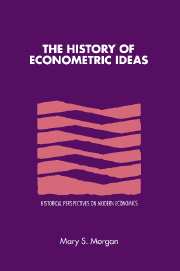Book contents
- Frontmatter
- Contents
- List of figures
- Preface
- Acknowledgements
- Introduction
- Part I Business cycles
- Introduction to business cycles
- 1 Sunspot and Venus theories of the business cycle
- 2 Measuring and representing business cycles
- 3 Random shocks enter the business cycle scene
- 4 Tinbergen and macrodynamic models
- Part II Demand analysis
- Part III Formal models in econometrics
- Conclusion
- References
- Index
Introduction to business cycles
Published online by Cambridge University Press: 26 October 2009
- Frontmatter
- Contents
- List of figures
- Preface
- Acknowledgements
- Introduction
- Part I Business cycles
- Introduction to business cycles
- 1 Sunspot and Venus theories of the business cycle
- 2 Measuring and representing business cycles
- 3 Random shocks enter the business cycle scene
- 4 Tinbergen and macrodynamic models
- Part II Demand analysis
- Part III Formal models in econometrics
- Conclusion
- References
- Index
Summary
The nineteenth-century economists did not, for the most part, recognise the idea or existence of regular cycles in economic activity. Instead, they thought in terms of ‘crises’, a word implying an abnormal level of activity and used in several different ways: it could mean a financial panic (that is the peak turning point in a commercial or financial market) or it could mean the period of deepest depression when factories closed. A financial crisis was not necessarily followed by an economic depression, but might be a phenomenon solely of the financial markets. There were a few exceptions amongst economists and industrial commentators who recognised a cyclical pattern in economic activity, including, for example, Marx. In addition, there was no agreed theory about what caused a crisis, indeed it sometimes seemed that not only each economist but each person had their own pet theory of the cause of crises in the economy. One telling example, ‘The First Annual Report of the Commissioner of Labor’ in the USA in 1886 listed all the causes of depressions reported to the various committees of Congress. This list ran to four pages, from
Administration, changes in the policies of
Agitators, undue influence of
through various economic and institutional reasons to
War, absorption of capital by destruction of property during
Work, piece.
There was not much chance of making sense of so many causes using the standard ways of gathering evidence in support of theories in nineteenth-century economics.
- Type
- Chapter
- Information
- The History of Econometric Ideas , pp. 15 - 17Publisher: Cambridge University PressPrint publication year: 1990



